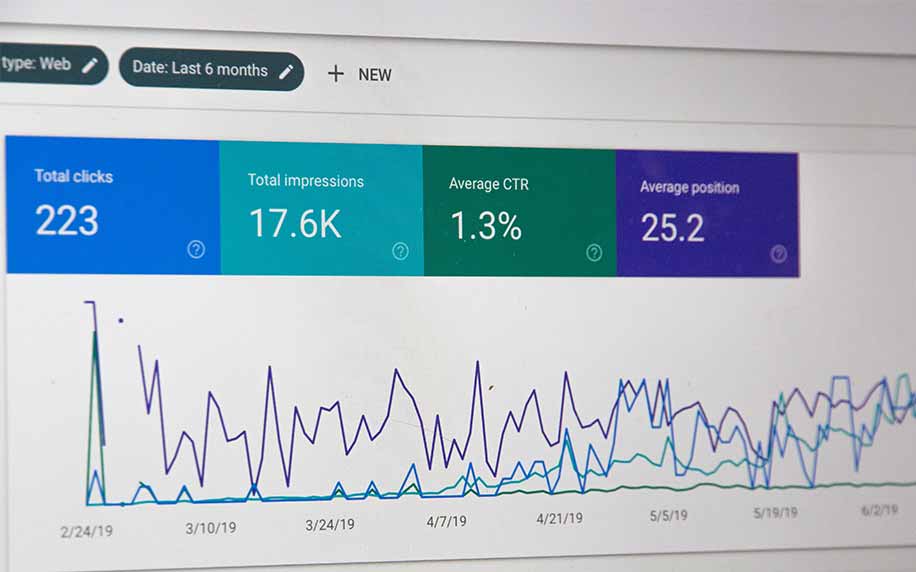Google is by far the dominant search engine worldwide. Over 90% of searches are carried out over Google. To maintain this dominance, Google must constantly change their search algorithms.
Their goal is to show users the content which they will find most useful. In the past few years, Google has drastically altered how some fields are ranked. One example of this is the Your Money or Your Life (YMYL) update.
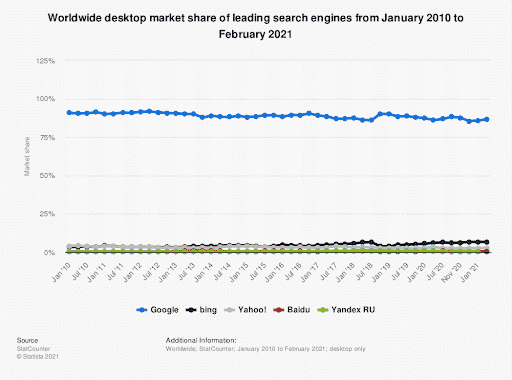
Table of Contents
What Are YMYL Pages?
In their Search Quality Evaluator Guidelines (SQEG), Google defines YMYL pages as, “pages or topics [that] could potentially impact a person’s future happiness, health, financial stability, or safety.”
In other words, YMYL pages are sites where individuals’ lives are at risk for negative impact if given misinformation. As the name implies, those sites may pertain to content surrounding money, lifestyle, medical, current events, etc.
Google neither has a clear-cut definition to what is considered YMYL nor will they tell you if your page falls under this category. Instead, their SQEG lists examples of YMYL topics as:

- News and current events – Factual content regarding business, science and technology, politics, etc. Some news articles like sports or editors are not YMYL.
- Civics, government, and law – Content pertaining to citizenry and legal issues. Examples are voting and child custody.
- Finance – Information surrounding monetary decisions and investments. These can include taxes, insurance, large purchases like homes, etc.
- Shopping – Information regarding goods and services, especially those offered online.
- Health of safety – Information on medicine, sickness and treatment, emergencies, and other medical related concerns.
- Groups of people – Content that may include discussion or claims about groups of race, religion, ethnicity, disability, gender, etc.
Since it is not possible to confirm if Google considers your page as YMYL content, changes to the Google search algorithm may unexpectedly affect your SEO.
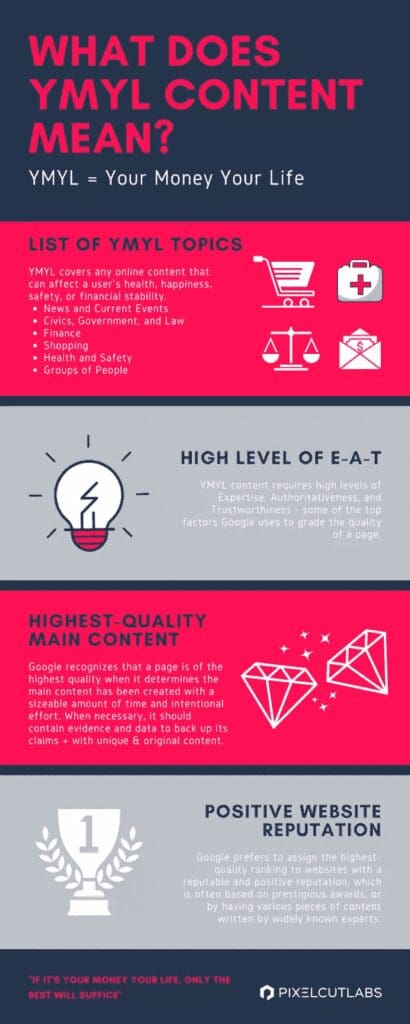
Why YMYL Pages were Targeted
It is presumptuous to say that YMYL pages were “targeted,” but they were heavily impacted. The reason is because YMYL pages are responsible for the wellbeing of Google searchers, and weak or wrong information can negatively impact readers.
Google states that “websites and pages should be created to help users.” By this regard, YMYL pages take high priority. This sector’s expectations seemingly increase with every major algorithm update as if Google is trying to increase the output of new and true information.
Factors to Consider After the YMYL Update
Since YMYL holds higher stakes in search engine ranking factors, Google has high expectations for it. They boost rankings for sites with quality content, ensuring that readers will see relevant, fresh, and reliable YMYL content.
Page Quality
Page quality is a gauge of how well a site satisfies users’ needs. The main content on your site is one key factor that determines the page quality. High quality pages have informative and valuable content and hold a high level of EAT.
The YMYL update heavily depends on page quality. The decline of YMYL page rankings after the update suggests that Google is looking for high quality content.
Google Search Algorithms
Understanding Google’s algorithms is a challenging task. Their constant changing of their search algorithm means businesses must stay in the loop, keeping tabs on when the algorithm may update.
The results of an update may bring your page up or down in rank and often, the reason is unclear.
For example, consider the August 2018 broad core algorithm update, which was nicknamed the Medic update. Google did not offer much of a heads-up before releasing the update, which misled many people of its significance. Many sectors like business and technology were affected, but YMYL pages experienced the largest impact.
Similarly, the 2019 September core update was another update that dropped a multitude of sites in rank. This is another great example of how Google’s volatile algorithm affects YMYL sites.
RankRanger’s graph illustrates the drops in ranking throughout 2019. The core updates in March, June, and September correlate with temporary drops in an example finance site.
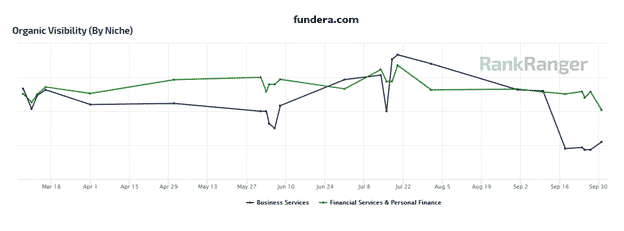
As you can see toward the right side of the graph, both business and financial services decreased in organic visibility around mid-September when the YMYL update happened. Especially for business services of fundera, the update drastically affected SEO.
Check out how other algorithm updates have impacted SEO in recent years.
Expertise, Authoritativeness, Trustworthiness (EAT)
EAT measures how quality a page is. Sites that excel in all three factors of EAT are considered high quality. What do those factors mean?
- Expertise – Displaying the site’s knowledge base through content. More knowledgeable sites will rank higher. It is essentially knowing what you’re talking about, researching topics thoroughly, and providing sufficient detail.
- Authoritativeness – Having a reputable business; reliable content. It is tied to domain authority and backlinks. Indicators of high authoritativeness exhibit repeat visitors and low bounce rates.
- Trustworthiness – Demonstrating that your company is legitimate and provides accurate content. You can do this by providing author bios and credible sources for claims.
EAT is critical for ranking in YMYL. The two concepts rise or fall together, so sites that do not practice EAT may suffer in SEO.
How To Rank YMYL Pages after the YMYL Update
Essentially, ranking YMYL pages high on Google’s search engine results page means giving the readers what they came for. Your Money or Your Life focuses on user experience. Any pages with priorities other than helping the user risks penalisation.
What Boosts or Penalises Your Content After YMYL?
For YMYL pages, pages that aim at making money and have intrusive advertisements are given lower page quality ratings.
Pages that are user focused, factual, and have high EAT ratings are given higher page quality ratings.
Having sufficient information on your website makes it seem more legitimate and boosts ranking. This can include:
- About us page
- Contact page
- Having a positive reputation
- Displaying fresh, reliable content
Contrastingly, having deceptive or duplicate content as another site penalises ranking.
Meeting User Needs
Users reach YMYL sites to receive important information regarding health, finances, lifestyle, etc. Google’s SQEG highlights that YMYL site visitor queries are one or more of the following intents:
- Know Query – Searches where users are looking for information. Example: how tall are football players?
- Do Query – Searches for completing a task/activity or interacting with some website. Example: buy flat screen tv.
- Website Query – Searches for a website or specific items within a website. Example: cooking YouTube.
- Visit-In-Person Query – Searches for information or location of a place. Users can be direct or more ambiguous; pharmacy vs. medicine, respectively. Example: nearest gas station.
With that in mind, Google needs a way for evaluators to calculate if user needs are met. Yet another means to measure page quality is the Needs Met Rating Guideline.
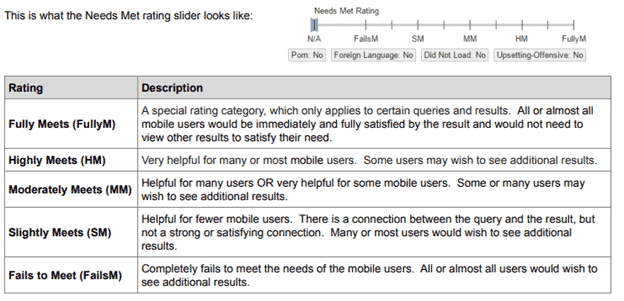
Here, we see again that user experience trumps. The Needs Met Rating Guideline rates satisfaction of mobile users. To rank high in YMYL, accessibility is another asset to consider.
Do note that site rankings are still algorithmic and are not based on these decisions by Google evaluators.
Case Studies: Recovering from YMYL Penalties and Regaining Trust
Understanding how others recovered from YMYL penalties can provide valuable insights for your own SEO journey. Here are two case studies showcasing successful recoveries:
Case Study 1: Health and Wellness Blog
Pre-penalty: A health and wellness blog with informative articles written by volunteer contributors lacked author qualifications and transparency about potential conflicts of interest. Google penalized the site for low E-A-T and inaccurate information.
Recovery strategy:
- Author verification: Established author profiles with bios and credentials for each contributor.
- Content audit: Removed inaccurate or outdated information and replaced it with evidence-based, well-sourced content.
- Transparency updates: Added disclosures about author affiliations and potential conflicts of interest.
- Backlink audit: Removed low-quality backlinks and built relationships with authoritative health websites for high-quality links.
Results: Within 6 months, the blog experienced a significant decrease in Google penalty signals. Traffic and rankings gradually improved, with a 20% increase in organic traffic within a year.
Takeaway: Transparency, content quality, and author expertise were key to regaining trust and recovering from the penalty.
Case Study 2: Financial Advice Website
Pre-penalty: A financial advice website published aggressive advertisements and lacked clear disclaimers about investment risks. Google penalized the site for potentially misleading content and low trustworthiness.
Recovery strategy:
- Content overhaul: Revamped existing content to focus on unbiased financial education and risk disclosure.
- Advertising review: Removed misleading ads and ensured clear separation between editorial content and paid promotions.
- Third-party reviews: Collaborated with financial experts to review and verify content accuracy.
- Contact information update: Increased website transparency by adding clear contact information and disclosure of editorial policies.
Results: The website saw a substantial decrease in penalty signals within 3 months. Organic traffic gradually recovered, with a 35% increase in qualified leads within 8 months.
Takeaway: Focusing on accurate and unbiased information, transparency, and user protection helped rebuild trust and overcome the penalty.
These case studies show that recovery from YMYL penalties is possible with dedication and effective strategies. Remember, prioritize transparency, accurate information, and building user trust for long-term SEO success in the YMYL landscape.
Latest Statistics and Trends in SEO and Google’s Algorithm Changes:
1. Content is King (More Than Ever):
- Google’s May 2023 Core Update emphasized E-A-T and high-quality content. Long-form, informative, and well-researched content resonates better with users and algorithms.
- AI-generated content is rising, but Google warns against its overuse and prioritizes human-written, valuable content that offers unique insights and experiences.
2. Mobile-First Indexing Reigns Supreme:
- Nearly 60% of web searches globally occur on mobile devices. Google prioritizes mobile-friendly websites, so responsive design and fast mobile loading speeds are crucial.
- Core Web Vitals, metrics measuring mobile page experience, will become even more critical for ranking in 2024.
3. Voice Search and Long-Tail Keywords:
- The popularity of voice search continues to rise. Focus on natural language and conversational keywords, understanding how people would ask questions verbally.
- Long-tail keywords (3+ words) become increasingly relevant, indicating more specific search intent and higher conversion rates.
4. Local SEO Dominates:
- Local searches (“near me” queries) are booming, especially on mobile. Optimize your Google My Business profile and ensure NAP (Name, Address, Phone number) consistency across online platforms.
- Location-specific content and reviews hold significant weight in local SEO rankings.
5. Technical SEO Remains the Foundation:
- Website speed, page structure, and internal linking still play a vital role in SEO success. Regularly audit your website for technical issues and implement proper optimization strategies.
- Core Web Vitals metrics (Largest Contentful Paint, First Input Delay, Cumulative Layout Shift) will directly impact ranking in 2024, so prioritize improving them.
6. Google Algorithm Updates:
- Stay updated on Google’s latest algorithm changes, such as the May 2023 Core Update and the upcoming Mobile-First Indexing switch in 2024. Adapting your strategies to these updates is crucial for maintaining relevance.
- Utilize SEO tools and resources to track algorithm changes and understand their potential impact on your website.
YMYL SEO FAQs:
1. What are YMYL websites?
Your Money or Your Life (YMYL) websites deal with topics that can significantly impact users’ health, finances, or well-being. Examples include medical information, legal advice, financial services, and parenting support.
2. Why is the YMYL update important for SEO?
Google prioritizes E-A-T (Expertise, Authoritativeness, Trustworthiness) for YMYL pages to ensure users receive accurate and reliable information. Ranking well requires demonstrating strong E-A-T in your content and website.
3. How can I improve my YMYL website’s ranking?
- Focus on content quality: Create informative, accurate, and well-researched content backed by credible sources.
- Build author expertise: Highlight the credentials and experience of your content creators.
- Establish site authority: Earn high-quality backlinks from relevant and trustworthy websites.
- Optimize for E-A-T signals: Ensure transparency, contact information, and clear authorship attribution.
- Stay updated on Google’s guidelines: Refer to Google’s Search Quality Evaluator Guidelines for latest insights on YMYL content.
4. What are common mistakes to avoid for YMYL SEO?
- Thin content: Avoid shallow or poorly researched content that lacks depth and value.
- Misleading information: Ensure content accuracy and avoid unverified claims or pseudoscience.
- Lack of transparency: Clearly state your website’s purpose, author credentials, and potential conflicts of interest.
- Unprofessional design: Invest in a professional website design that fosters trust and user experience.
- Ignoring mobile optimization: Ensure your website is responsive and performs well on mobile devices.
5. What tools can I use to track my YMYL SEO performance?
- Google Search Console: Monitor website traffic, search queries, and ranking positions.
- Backlink analysis tools: Analyze your website’s backlink profile and identify opportunities for improvement.
- SEO competitor analysis tools: Benchmark your SEO performance against competitors in your niche.
- Website speed and performance audit tools: Identify technical issues impacting your website’s SEO.
6. Is it safe to use AI-generated content for YMYL websites?
While AI-generated content can be beneficial, it’s crucial to avoid relying solely on it for YMYL topics. Google emphasizes human-written, high-quality content, and overusing AI-generated content may negatively impact your E-A-T and ranking.
7. How long does it take to see YMYL ranking improvements?
Building E-A-T and improving YMYL rankings is an ongoing process, not a quick fix. Implement SEO strategies consistently and monitor your progress over time. It may take several months to see significant improvements, depending on your niche and competition.
Takeaways
Navigating the YMYL landscape in SEO may seem daunting, but it’s ultimately about earning user trust and providing genuine value. By prioritizing E-A-T in your content and website, you position yourself as a reliable source of information in your field, attracting both users and search engine algorithms.
Remember, this is not a sprint, but a marathon. Building authority and expertise takes time and dedication. Embrace ongoing optimization, adapt to algorithm shifts, and always prioritize high-quality content that empowers your audience.
This guide has equipped you with the knowledge and resources to navigate the ever-evolving world of YMYL SEO. Now, it’s your turn to put these insights into action, cultivate trust, and establish your website as a beacon of reliable information in your niche.
Embrace the opportunity to impact lives and make a positive difference through your content. The rewards of successful YMYL SEO extend far beyond rankings and traffic; they lie in the satisfaction of knowing you’ve provided valuable information that genuinely helps your audience.
Evidently, the YMYL update has changed the way some businesses have to present their content. Pages considered YMYL need to carefully consider the page quality and deploying EAT.
In the greater scope of it all, Google’s unpredictable algorithm can send your website ranking awry. Without frequently monitoring your page traffic, your page may end up lost in the search results.
Being ranked high on Google’s search results page does not guarantee a permanent placement. When the next algorithm update inevitably releases, will your company be ready to adjust SEO strategies?
Connect with an expert to strengthen SEO strategy and optimise your content marketing.

